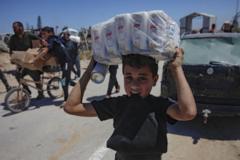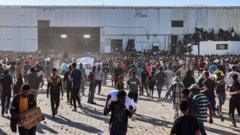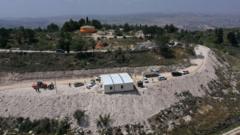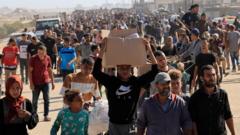**Noura and her husband Mohamed, once filled with excitement over their impending parenthood, now navigate profound loss amidst ongoing violence that has obliterated their aspirations.**
**Devastation of IVF Dreams: The Toll of Gaza Conflict on Hopeful Parents**
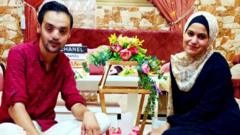
**Devastation of IVF Dreams: The Toll of Gaza Conflict on Hopeful Parents**
**As the war in Gaza escalates, countless families face heartbreak over lost embryos and shattered dreams of parenthood.**
In the heart of a conflict-ridden Gaza, personal tragedies are entwined with the broader chaos of war. Noura, a 26-year-old Palestinian woman, recounts her emotional rollercoaster as she was on the verge of becoming a mother after years of IVF struggles. “I was overjoyed,” shares Noura, remembering the moment a pregnancy test confirmed her long-held dream. However, that joy turned to despair as the region erupted into conflict following Israel's military response to Hamas's attacks on October 7, 2023.
The violent escalation, which has claimed thousands of lives, has left Noura and her husband Mohamed in a dire situation. Displacement and constant danger disrupted their lives and forced them to abandon the care essential for her pregnancy. Amid relentless bombings, Noura recalls the harrowing experience of trying to reach a hospital during a medical emergency. Tragically, she suffered a miscarriage that resulted in the loss of her twins, both born prematurely due to the severe lack of medical support.
To compound their heartache, Noura and Mohamed lost their hope for future children when Al-Basma Fertility Centre, where their embryos were stored, was shelled, destroying nearly 4,000 frozen embryos and vital reproductive materials. Dr. Baha Ghalayini, the centre's director, explains that the destruction of such a facility was catastrophic, taking with it not just statistics, but life-changing hopes and dreams for many couples eager to start families.
The loss of these embryos has affected dozens of women, many of whom find it scientifically challenging or impossible to attempt IVF again due to age, health conditions, or the failure of previous treatments. Amidst the ongoing turmoil, Noura and many others are left confronting a bleak reality where past hopes of joyous beginnings are overshadowed by grief and loss.
Responses to the destruction of fertility clinics in Gaza have been embroiled in political contention. The Israel Defense Forces claim adherence to international law, stating that they do not intentionally target civilian establishments, while accusations of systematic attacks on reproductive capabilities have been raised by various human rights organizations. The United Nations has described such actions as potentially genocidal, citing a targeted effort to inhibit births among Palestinians.
In the wake of this tragedy, multiple families share similar fates. Women like Sara Khudari, whose wait for IVF was disrupted by war, and Islam Lubbad, who lost both her pregnancy and frozen embryos, find themselves struggling with the psychological toll of uncertainty, loss, and the fading possibility of parenthood.
With all fertility clinics in Gaza either destroyed or non-functional, many are left grappling with the question of whether they will ever realize their dreams of family against a backdrop of pervasive violence and instability. The war's personal consequences are profound, as hopeful parents become casualties of conflict, robbed not only of their future children but also of the dreams that once illuminated their lives.


